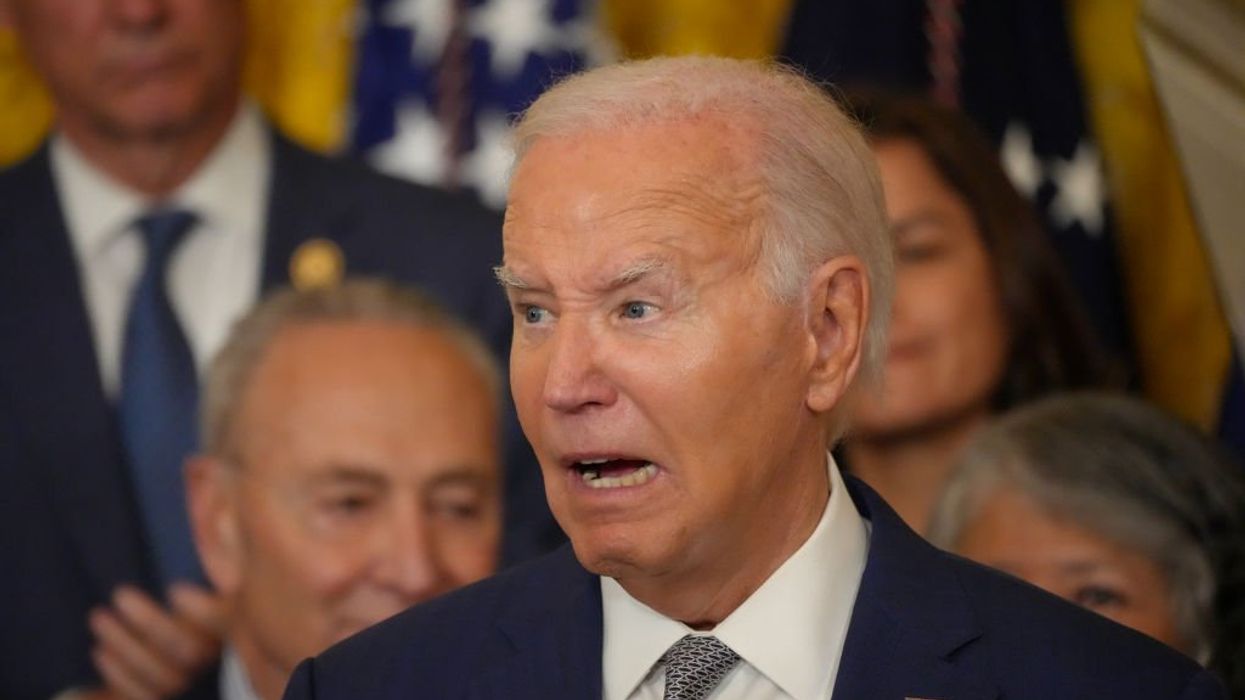
Photo by Andrew Leyden/NurPhoto via Getty Images

Americans banking on charged cars and internet connectivity may have to wait a while.
President Joe Biden has a tendency to make grand promises he can't make good on.
For instance, ahead of the 2020 election, then-candidate Biden promised the American people in four debates and during his CNN town hall interview that he would build half a million new charging stations across the nation if elected.
After taking the White House, Biden reiterated his promise, stating in November 2021, "We're going to build out the first-ever national network of charging stations all across the country — over 500,000 of them."
Of the 1,200 billion taxpayer dollars blown on the Democratic infrastructure package supported by Sen. Mitch McConnell (R-Ky.), $7.5 billion was set aside to building Biden's promised EV stations.
As of last month, only eight stations had been constructed nationwide.
The Biden administration made another big pledge in 2021: Unserved Americans would soon have reliable high-speed internet. Like the electric vehicle charging stations, this connectivity has failed to materialize.
'We're barreling toward a broadband blunder.'
Brendan Carr, a Republican commissioner on the Federal Communications Commission, noted Friday, "In 2021, the Biden Administration got $42.45 billion from Congress to deploy high-speed Internet to millions of Americans. Years later, it has not connected even 1 person with those funds. In fact, it now says that no construction projects will even start until 2025 at earliest."
The Broadband Equity, Access, and Deployment program is a federal grant program administered by the National Telecommunications and Information Administration that supposedly "aims to get all Americans online by funding partnerships between states or territories, communities, and stakeholders to build infrastructure where we need it to and increase adoption of high-speed internet. BEAD prioritizes unserved locations that have no internet access or that only have access under 25/3 Mbps."
Grantees are supposed to receive taxpayer cash to "support broadband planning and related capacity efforts, from mapping, staffing state/territory broadband offices, to outreach and coordination with local communities."
"The Biden Admin's failure to turn even a single shovel's worth of dirt with this $42.45B is not just predictable, it was predicted," continued Carr, referencing an Aug. 18, 2022, letter from a number of U.S. senators, which indicated the initiative might be ill-fated.
The lawmakers noted that there were unnecessary burdens in the NTIA review process and that the Notice of Funding Opportunity process "creates a complex, nine-step, 'iterative' structure and review process that is likely to mire State broadband offices in excessive bureaucracy and delay connecting unserved and underserved Americans."
The Washington Times indicated that as of this month, only nine states and the District of Columbia had secured approval for the BEAD program.
Last year, Republican senators highlighted other issues with the Notice of Funding Opportunity for the BEAD program in a letter to U.S. Assistant Secretary of Commerce Alan Davidson. They noted that it:
Carr added, "The Biden Administration's policy cuts make clear that we're barreling toward a broadband blunder. Rate regulation, thumb on the scale for government run networks, technology bias, union preferences plus many more problems = many of the broadband builders that would normally bid to do this work are not expressing interest in taking these dollars."
The commissioner made clear that the Biden administration has not only failed to deliver, but has kneecapped those who could — revoking "an award to Starlink that would have delivered high-speed Internet to 642K rural locations."
In August 2022, the FCC leadership reversed the agency's previous decision to provide an $885 million infrastructure award to Elon Musk's Starlink, which it had won at an FCC election in 2020.
Fox News Digital indicated that when pressed for comment, the White House wouldn't speak to the failure of the project but cited three states' receipt of federal funding for broadband projects, apparently under other initiatives.
Like Blaze News? Bypass the censors, sign up for our newsletters, and get stories like this direct to your inbox. Sign up here!